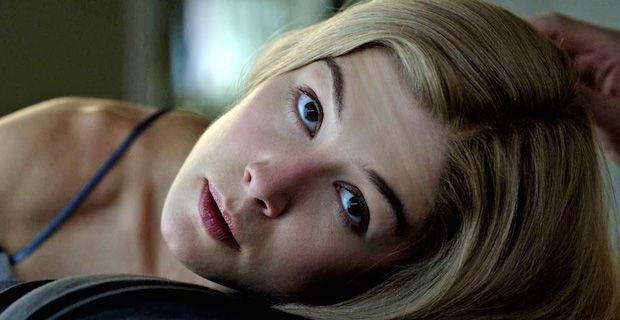By Graham Carter and Zachary Brailsford
Graham’s Take:
When David Fincher made the switch from film to digital, he became the Hollywood filmmaker. Much like Alfred Hitchcock, Otto Preminger and Howard Hawks, Fincher perfectly walks the line between art and entertainment. Hitchcock was known for building suspense, Preminger for understanding the power of fascination and Hawks for his obsession with masculinity. Put all these traits into one guy and you get Fincher, whose films post-Zodiac (his first movie shot digitally) are meticulously constructed down to the last detail. His latest film “Gone Girl” is no exception.
I read “Gone Girl” when I found out about Fincher’s upcoming adaptation, and I would be lying if I said I did not love it. I was able to look past all the smarmy, too-cool-for-school prose from Gillian Flynn and get completely wrapped up in the characters and the twists and turns of the plot. I expected Fincher to take everything that made the book an enjoyable read and expound upon it. His film, from a script written by Flynn, does exactly that and elevates the pulpy thriller to high art.
The basic plot of the film involves Nick (Ben Affleck) and Amy (Rosamund Pike) Dunne, a married pair of writers from New York, who are both laid off during the great recession from a few years back. At the same time, Nick’s mother becomes terminally ill, so he and Amy decide to move back to Nick’s hometown in Missouri. There, they can help take care of Nick’s mother and ease their financial troubles. The film begins on their fifth anniversary when Amy suddenly goes missing. The rest of the film is told from Nick’s point of view during the search for Amy, with intermittent flashbacks from her diary.
While the film cannot include many of the small details of the novel that I really enjoyed, it is important to remember that the film’s plot is much different from the novel’s. Both entities of the story have a message to deliver. However, the message is delivered with more urgency and emphasis in the film and is much more powerful because of it. The plot is simplified, and we can see the true essence of Flynn’s words – how do we present ourselves to others? To the ones we love the most? How can two people be in love and expose their true nature? Can a marriage be honest? Fincher’s answers to all of these questions are dark, but aren’t cynical for cynicism’s sake. The film is about narcissism, and through Nick and Amy, it says a lot about the human condition. These are terrible, awful people, but you can’t help wanting to understand them.
Of course, since this is Fincher, the technical aspects of the film are unbelievably precise and calculated, but never cold. Scenes build and quickly fade as Fincher chisels away the mysteries of the plot and more importantly the characters. The scenes that are seen as the truth in the film (Nick’s side of the story) are turned into vignettes by the quick fades to black, which separates his half and Amy’s, causing you to question everything as a story. It recalls the fade-outs after every murder in “Zodiac.” This film isn’t as good as “Zodiac,” which is (in my opinion) one of the greatest American films of this young century, but I would say it is a close second.
Zachary’s Take:
Caution: Spoilers
The interesting thing about those fade-outs (or, I might actually say the annoying thing) is that they’re completely emblematic of a recent problem that has erupted in the cinema of David Fincher: He creates an atmosphere in which the movie seems as though it should end, and then he extends the running time about 20 minutes (the same is true of the [regrettable] case of “The Girl with the Dragon Tattoo” [2011]). It is not as though his stories are finished, but, in many ways, it certainly feels as though they have already wrapped up. In “Gone Girl,” Amy arrives back home after having killed her “captor,” and the camera raises as she falls into Nick’s arms -— cue the fade-out. “What an ending!” you might say. And then the movie keeps going. And the scenes are shorter. And it feels like everything is tacked on and therefore substantially less important than it should be, leaving us to question whether the pacing is actually beginning to disturb our sense of the movie as both entertainment and art.
Beyond this, the film is paced well, which feeds a creeping feeling of dread throughout the movie. It is one of the first movies I have watched in a long time during which I both wanted to see it progress and also wanted to stop watching it from the anxiety caused by each new plot development. Did Nick do it? What do the cops know? Who is going to get arrested now? ARE YOU KIDDING ME THAT SHE’S GOING UP THERE AND HAVING A PRESS CONFERENCE RIGHT NOW — GEEZ, THIS IS THE WORST TIME OMG!?!? It works in surprisingly similar ways to Steven Soderbergh’s final theatrical output, “Side Effects” (2013), in its incredibly revelatory nature (although the Soderbergh film completely switches to a genre film at one point, never really looking back, unlike “Gone Girl” which, while careening around crazy corners, mostly sticks to its guns), its allowances for shifting beliefs toward the protagonist (who even is the protagonist?) and its circular logic (though I would say that “Side Effects” ends on a much happier note than the sourness of Fincher’s film).
All of this is to say that, while the film is problematic in keeping you with it until its conclusion, it still has the ability to make your heart pound, like … well, like a heart pounding really, really fast (maybe you ate some ice cream too quick, and your body starts having a bad time, so your heart goes sdfihfoaisfmowfaiojiuivhsj). It is fun and exciting and gives you more twists than you could probably even hope for. And while I do agree with Graham that it is not as good as “Zodiac” (really, what is?), I also agree that it is still one of David Fincher’s best films in recent years.














































